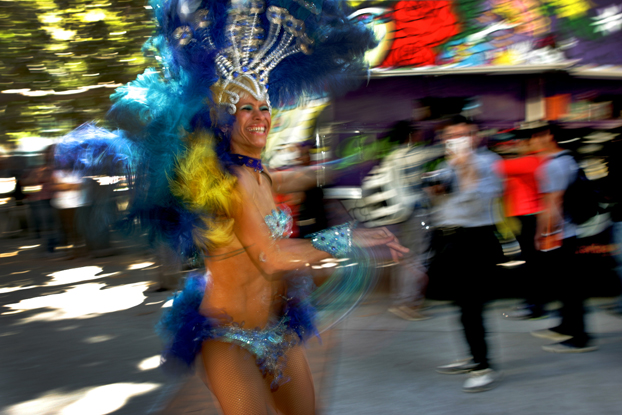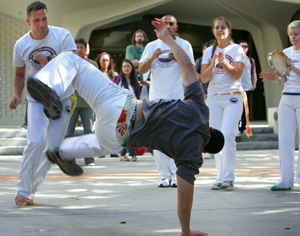 Caption: Samba dance troupe Glaucia Brazil at Carnaval Brasil Feb. 21 on campus. Photo: Karen Tapia Download Photo
Caption: Samba dance troupe Glaucia Brazil at Carnaval Brasil Feb. 21 on campus. Photo: Karen Tapia Download Photo
Moving to a Conga Beat
Campus Celebration Focuses on Brazilian Culture
Feb. 21, 2012
Led by dancers in colorful feather headdresses and beaded bikinis atop platform heels, scores of revelers joined a gyrating conga line in celebration of “Carnaval Brasil” Tuesday, in the center of campus.
 Caption: Capoeira Mandingueiro, an Afro- Brazilian martial art dance group took center stage at Carnaval Brasil. Photo: Karen Tapia Download Photo Below is video of one of Capoeira Mandingueiro’s performances.
Caption: Capoeira Mandingueiro, an Afro- Brazilian martial art dance group took center stage at Carnaval Brasil. Photo: Karen Tapia Download Photo Below is video of one of Capoeira Mandingueiro’s performances.
The crowd, some in Mardi Gras beads and masks, were treated to performances by samba dance troupe Glaucia Brazil and Capoeira Mandingueiro, an Afro-Brazilian martial art dance group.
As the dancers performed, a number of CSUF professors who teach Portuguese or whose research involves either Brazilian culture and/or the physical environment fanned out to inform students about study-abroad opportunities and answer questions.
For example, Robert A. Voeks, professor of geography and Brazilian plant expert, told of the history of the berimbau, a tall one-string bow instrument that was being played by members of Capoeira Mandingueiro.
“Enslaved Africans brought that instrument to Brazil,” Voeks said. “It was integrated into capoeira. It’s made mostly of plant products.”
Over the course of 350 years, about “10.7 million forced African immigrants reached the shores of the Americas,” Voeks said. “From language to food, music to dance, and healing traditions to belief systems, Africans contributed mightily to what would emerge over time as Brazil’s unique cultural identity.”
Voeks is a member of the Brazil Partnership Steering Committee, a group of faculty members and administrators pursuing scholarly and programmatic cooperation between academics at CSUF and their counterparts in the South American country.
The group organized Carnaval Brasil to boost campus interest in studying and conducting research in Brazil, said Sandra M. Perez-Linggi, associate professor of modern languages and literatures and a committee member.
“Today is about having fun while exposing students to a Brazilian Carnival,” Perez-Linggi said. “We want students to get excited about going to study in Brazil, as we are planning on offering a study-abroad program there in the summer of 2013.”
Daysi Espinosa, president of the campus Latin American Studies Student Association, said she plans to sign up for the summer program, which will be taught by Voeks.
The 21-year-old Latin American studies major said she is telling her fellow students about the program that she called an “exciting opportunity” to gain awareness and understanding of another culture.
Perez-Linggi said the event aimed to ignite interest “in a country that is playing an important economic, political and cultural role in our increasingly interconnected world.”
Up next for the committee: “Besouro” and “Central Station,” the remaining two films in the free Brazilian film series.
Both “Besouro” and “Central Station” will screen at 5 p.m. Feb. 27 and March 5, respectively, in Room 167 of the Education-Classroom Building. Each film will be followed by a faculty-led discussion. The public is welcome to attend.
